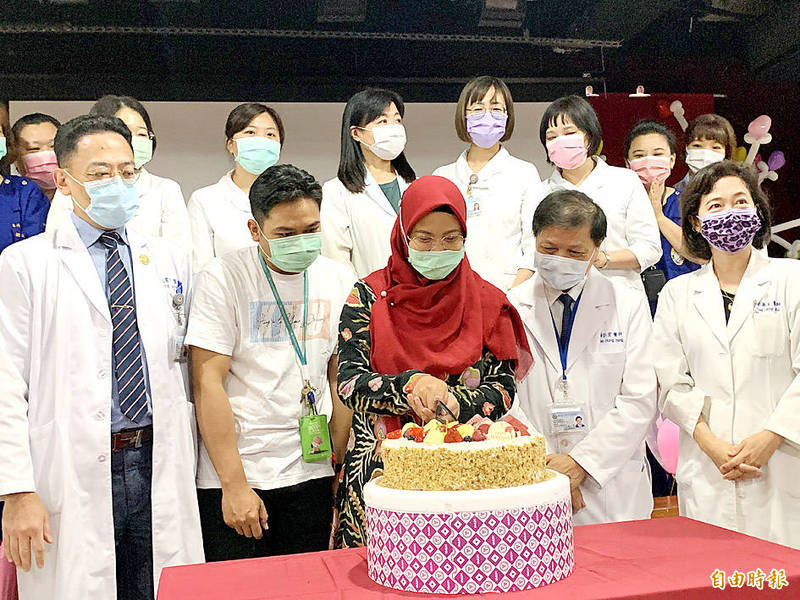《TAIPEI TIMES》 Cabinet unveils NT$9.1bn budget to boost birthrate

An Indonesian doctoral student, center, front row, surrounded by doctors and staff of Kaohsiung Medical University, and her husband, second left, yesterday cuts a cake to celebrate the birth of her child on Wednesday last week after receiving IVF treatment at the hospital. Photo: Fang Chih-hsien, Taipei Times
By Lee Hsin-fang and Jonathan Chin / Staff reporter, staff writer, with CNA
The Executive Yuan yesterday unveiled a NT$9.1 billion (US$325.1 million) package of subsidies for parental leave, prenatal screenings and in vitro fertilization (IVF) procedures in a bid to boost the nation’s birthrate.
The parts of the proposal that do not require legislative consent are to be implemented from July 1, Executive Yuan spokesman and Minister Without Portfolio Lo Ping-cheng (羅秉成) told a news conference in Taipei after a regular Cabinet meeting.
Amendments to the Employment Insurance Act (就業保險法) and other regulations would increase the allowance for parental leave from 60 percent of insured salary to 80 percent, he said.
The increased allowance, which is to cost NT$4.2 billion, would draw funding from sources other than the Labor Insurance Fund to avoid crowding out other benefits, he said.
Amendments to the Act of Gender Equality in Employment (性別工作平等法) would allow spouses to go on concurrent parental leaves with allowances for one to six months, and each household can avail of this leave twice, he said.
Other, shorter-term leaves for childcare would also be permitted under proposed changes, he said.
In addition, workers would be able to apply for unpaid parental leave regardless of the employment status of their spouse and without providing a reason for doing so, he said.
Workers would have to give employers advance notice before taking parental leave to facilitate staffing arrangements at the workplace, he said.
Eligibility for the government’s IVF subsidies would be broadened to include all married couples who cannot conceive if at least one of the spouses is Taiwanese and the woman is under 45 years of age, Ministry of Health and Welfare Deputy Minister Shih Chung-liang (石崇良) said.
Income restrictions were removed after the program reported that only 52 low and medium-income couples enrolled for IVF subsidies, which produced only seven births over the past six years, he said.
Higher-income households are to receive a subsidy of NT$100,000 for their first IVF procedure and NT$60,000 for each one after that, he said.
As before, low and medium-low income households are to receive a subsidy of up to NT$150,000 per procedure.
Households in which the wife is younger than 40 years old can claim subsidies for six IVF procedures per conception, while households in which the wife is aged 40 to 45 can claim three.
Officials estimate that the expanded subsidies would benefit between 23,000 and 28,000 households, and that the program would cost up to NT$3.2 billion.
Free prenatal screenings would be increased from 10 to 14 for each pregnancy, while coverage would be broadened to include screenings for gestational diabetes and anemia, and two ultrasound tests.
Subsidies for the screenings would also be raised to improve the health of pregnant women, reduce infant mortality rate and encourage people to go into obstetrics.
The revised prenatal screening subsidies should benefit about 160,000 households and cost about NT$1.25 billion.
新聞來源:TAIPEI TIMES
















